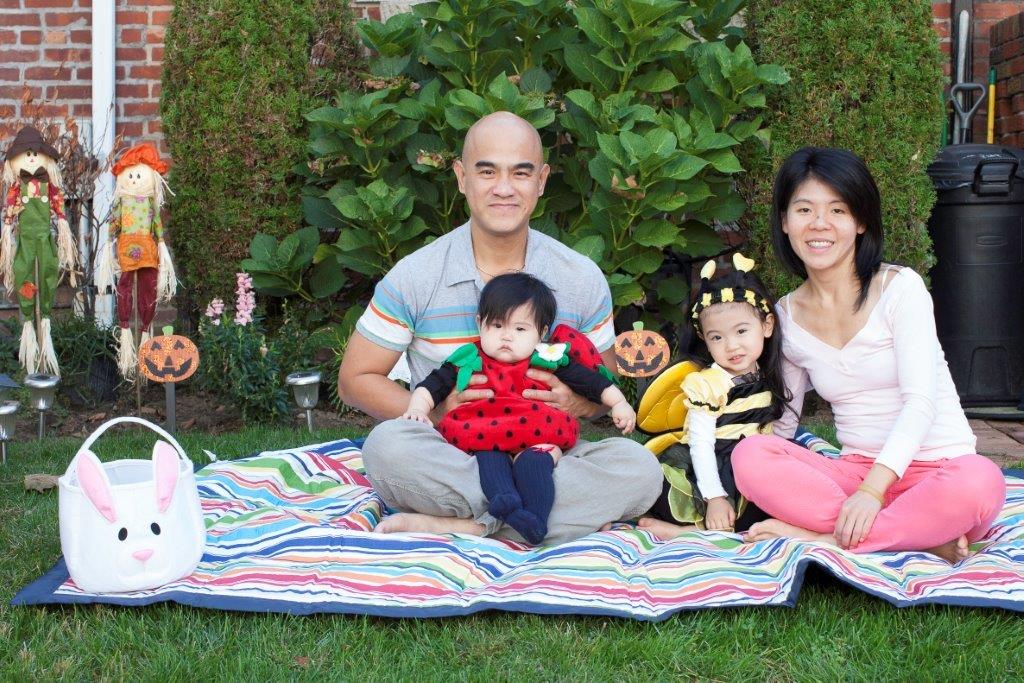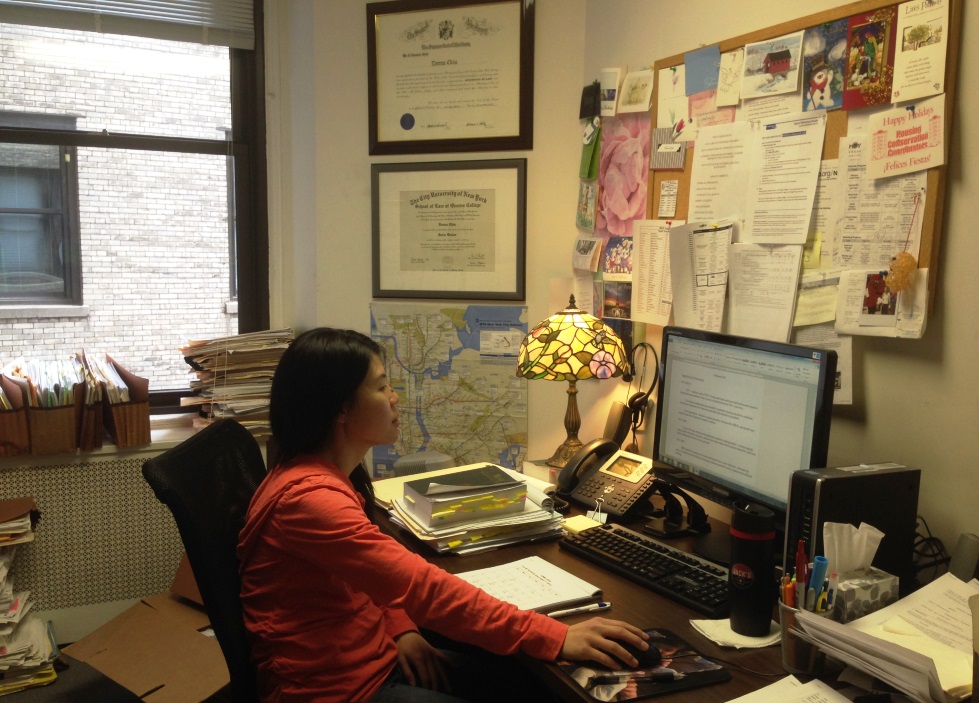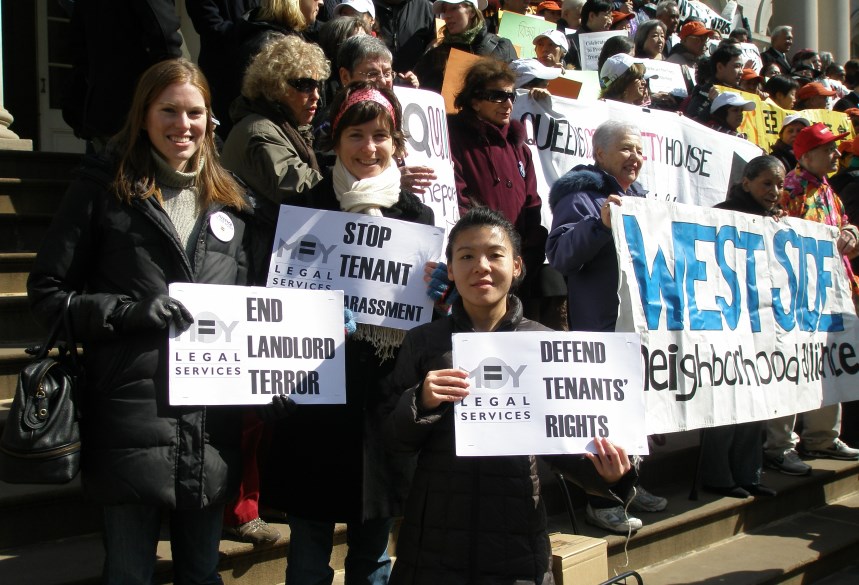By Ismary Munet
As a Senior Staff Attorney for MFY Legal Services, Inc., Donna Chiu, like other public interest lawyers, provides free legal services to her clients, but unlike many she helps her clients in their native dialects. She and her family immigrated to New York City at the age of five years old. Growing up in the city surrounded by Chinese immigrant family, friends, and neighbors, she learned and decided that her community needed a helping hand. With a love for her career, and a passion for sharing her knowledge and helping others, Chiu has not only helped many in the Asian American community, but also many other New Yorkers. She is excited to share her story, but also wants others to know that she is “a very average, normal Chinese immigrant. But the whole point is that even a very normal, average Chinese immigrant girl can be a positive influence in the world – even if it is just in her own backyard. One small change is still a change. Many small changes can add up to be a big change.”
1. Tell me about yourself, your background. What is your childhood story?
First, I am a mother to my two beautiful girls, Hillary and Jacqueline. Hillary is three and a half years old and Jacqueline just turned one years old. Second, I am a legal services attorney. My work primarily involves ending frivolous evictions and keeping the most vulnerable New Yorkers in their rent-protected homes in the area South of Houston Street, which includes Manhattan’s Chinatown. These people are overwhelmingly seniors, the disabled and working-poor immigrants. My employer, MFY Legal Services, Inc., is a free civil legal services provider. This means it provides legal services free of charge.
I am an immigrant myself since I immigrated to New York from Hong Kong, China with my parents when I was five years old. My childhood story is one that is familiar to most immigrants in New York. My late sister and I grew up watching my parents take jobs that they were over-qualified for; they also took turns attending night school to earn advanced degrees, because the ones they earned in Hong Kong didn’t really mean anything in America; at night, they had to make time to cook for us and help us with our homework. Watching my parents struggle helped me learn that hard work and pain is and will be a part of life. As they say, “no pain, no gain.”
2. Not many people who pursue a career in law think of providing free services. What made you pursue your career?
I was sure I wanted to practice public interest law, which is law in the service of the public, when I decided to become a lawyer. Since immigrating to New York when I was five years old, I have been raised in, around and by the Chinese immigrant community. Most of my summer jobs growing up involved working with the children of immigrants; meeting the media and entertainment needs of the Chinese immigrant community; or delivering health education to the Asian community. Through my interactions with the community and my parents, I learned their struggles and slowly realized the different impediments preventing them from achieving the “American Dream.” It then occurred to me that I can help make their lives better simply by providing them with the legal information, and knowledge that they lacked in order to make better choices and improve their standards of living. I was half-way to achieving this goal since I am bilingual, having learned to speak and write English to supplement my native language, Cantonese.
3. What do you like to eat?
I love salty and greasy foods like pizza, fried chicken, mozzarella sticks, burgers and pan-fried dumplings. But I only eat these occasionally. All the other times, I try and stick to a diet that doesn’t add back all the calories I burned exercising. This means sushi rolls, salads, vegetables and whole wheat sandwiches.
4. Do you have any regular place you go to eat in Chinatown?
Since I live in Brooklyn, the only opportunities for me to eat in Manhattan’s Chinatown are usually lunch time and special occasions. For lunch, my coworkers and I usually go to the XO on Elizabeth Street or Royal Seafood Restaurant on Mott Street for dim sum. As you can see, value and quality are both important when it comes to lunch. For special occasions, my family and I usually go to Peking Duck House on Mott Street and Ping’s Seafood Restaurant, also on Mott Street.
5. What experiences did you encounter growing up as an Asian American and Chinese immigrant?
One of my most memorable experiences growing up as a Chinese immigrant in New York, was when I was in the seventh grade at the Catholic elementary school my parents paid to send my sister and me, because it was close to where my grandfather lived, which meant he could pick us up after school. In my seventh grade class, there were about a handful of Chinese students. Most of the other students were Latinas or Latinos, which was the make-up of SoHo and the Lower East Side back then in the early 90s. I remember one day the teacher was doing a tally of the racial make-up of the class. We were told to stand when she called out our ethnicity or race. When she called out Asian or Asian-American, I remember standing very slowly and being very embarrassed that I was Chinese. I honestly wished I was a Latina, just like my other classmates.
Now, years later, when I think back about that moment in time, I try to convince myself that there must have been some news related to China or Japan leading to anti-Chinese or anti-Japanese sentiment, which caused me to feel embarrassed about being Chinese. Or maybe, I just didn’t have any reason to be proud to be a Chinese girl when I was in the seventh grade. After graduating from this Catholic elementary school in the eighth grade, I went on to Brooklyn Technical High School. I didn’t have any problems being proud of my heritage there as about 30% of the student body was Asian. But my experience in the seventh grade made me see how different I was from the people around me. I learned that now I lived in America, and just like how I saw myself differently, people will see me differently simply because of my race. I also learned that there are things about myself that I can never change like my ethnicity or my parents. I also cannot control how people will react to me. I’ve come to terms with the fact that I am different. What I love about America is that it is okay to be different.
6. What would you want others, who are facing adversity, to know?
Bad times or adversity will eventually pass. Life is a cycle. There will be ups and downs. Another analogy is like the sun that always comes out after the rain.
If you are experiencing good times right now, take this opportunity to prepare yourself for the bad times that will eventually come. For example, save money now to prepare for a possible loss of income. Or eat healthy and exercise now to strengthen your immune system to weaken the effects of any illness or germs you encounter. If you are going through bad times now, recognize it as a challenge. It’s a test to see how well you handle yourself. People say bad times or adversity are always life-changing moments, because they are opportunities for you to learn about your limits. The challenge is to find your strength and pull yourself out of the adversity. It really is a challenge of understanding that your mind is stronger than any matter. Keep believing that you can achieve it and don’t stop believing it until you do.
7. Who do you admire? Why?
I don’t have to look far for my role models – my parents. Yes, it’s a cliché. But now that I am a parent myself, I can appreciate how hard it is to raise young children and in New York too! When I think of what my parents went through to raise my sister and me, I am reminded that I still have more room for improvement. My parents immigrated to New York solely so that my sister and I could take advantage of the better opportunities available here in America. They were both white collar professionals in Hong Kong so that could have and did lead pretty laid back lives before immigrating to New York. Instead, they came to America where they had to start all over. In order to earn a living, my dad became a waiter and my mom became a seamstress. They took turns going to night school to earn the type of college and advanced degrees that mattered in America. They also prepared dinner for us and helped us with our homework and put my sister and me through college and then our professional degrees. And of course, as the typical child of immigrant parents, I was a nightmare at times. I don’t always agree with the choices my parents made when it came to disciplining and raising us, but there is no doubt they did what they genuinely believed was best for us.
8. You help to make sure diversity is maintained in NYC. Do you encounter a lot of diversity within your work?
Luckily for me, I work in legal services and also at MFY Legal Services, which embraces diversity among the staff and also among the people we serve. Another way I encounter diversity is through the work that I do. Aside from defending clients in Housing Court in eviction cases, I work with other community partners to brainstorm on ways to protect our clients from being taken to court in the first place. In the past, I have also given testimony to the New York City Council on how specific issues have affected my clients. Notably, MFY is a champion of making sure that all city agencies provide equal language access to Limited-English proficient people as a way to meaningfully preserve real diversity in New York.
9. What do you think the gentrification of Chinatown is doing to that neighborhood?
Manhattan’s Chinatown has really become a tourist attraction. In my work, nowadays I see international investors buying into the heart of Chinatown. As part of their investment, they plan on getting rid of the rent protected tenants and then renting to people who are willing to pay market-rate. With that change, the types of businesses in the neighborhood will change as well. Businesses who plan to profit from the new residents will offer services and products to cater to their needs. The Lower East Side is a prime example. The other types of businesses will be geared towards the people who commute daily to Chinatown for work and then return to Brooklyn or Queens at the end of the day. In this second category, I’ve noticed that the only sustainable businesses in Chinatown are bakeries, hair salons, beauty shops and Chinese dry goods stores. Restaurants are divided into categories. Those whose foods are expensive, because their business model is to cater to “American” customers, i.e. Peking Duck House; and those whose foods are still relatively cheap with quality as an afterthought. Most New Yorkers recognize nowadays only recent immigrants settle in Manhattan’s Chinatown. After a few years, immigrants move to Brooklyn and Queens as they adapt to American life, and become more familiar with the transportation and streets. Nowadays, I can get the kinds of foods and goods that use to be available only in Manhattan’s Chinatown in Brooklyn’s Bay Parkway or Bensonhurst Chinatown.
10. Why is it important that Limited-English Proficient individuals receive interpretation and translation service when accessing NYC services?
It is critical that New York City agencies and those agencies that receive federal, state, or city funding provide interpretation and translation services to people who are limited-English proficient, because this is the only way people can have meaningful access to the service and information. One of the main reasons why I wanted to become a lawyer is to be able to share legal information and knowledge with immigrants who are not aware of it, because they cannot access it. Having all the right information is absolutely critical to being able to make the right choices. The information also needs to be readily available. Having the information translated or being able to communicate with city employees through an interpreter means the information is available. It is a simple way immigrants can empower themselves.
11. You’ve helped many people along w/ MFY Legal Services Inc. What does that mean to you?
I love my job as an attorney at MFY Legal Services, because I get to be part of the solution. Many clients come to MFY with legal problems. Often, it is a potential eviction – a problem they do not have the expertise to solve on their own, or the resources to hire a private attorney. It gives my life real meaning to be able to use what I know, or a skill I have been lucky enough to learn to help someone get out of trouble.
I also take pride in the fact that my colleague and I try our best to help our clients in their native dialects. Many of the clients of the Lower Manhattan Justice Project at MFY are Chinese immigrants. Their problems and solutions make more sense to them when they are explained to them in their own dialects. Also, I know from personal experience that thoughts and ideas do get lost in translation. So, we try to avoid unnecessary layers in our communications.
One thing that I really look forward to is sharing my choice to be a legal services attorney at MFY and being able to help strengthen the Chinese community with my daughters. I look forward to the day when my girls become curious about what I do for a living. I hope they take from my life that the most rewarding way to live is to be able to share what you know, and to have people to share it with.





AsianInNY – you guys did an amazing job sharing my story with your readers!
I feel so privileged to have this opportunity. Keep up the great work!
Thanks for a great review and role model as the most Inspiring AsAm leaders have the
best stories and sacrifices for all in this city. I sure can relate to being “different” even as we are artists and strive for creativity. Bravo to both of you